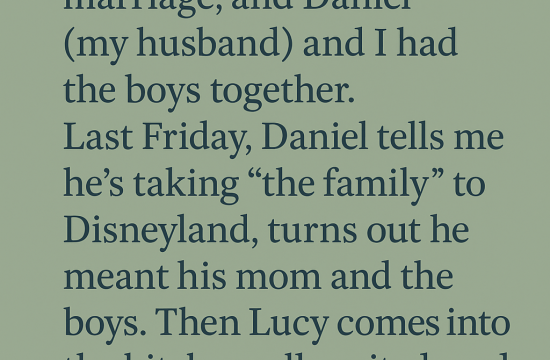My mother has always been my greatest source of inspiration. As a housekeeper at an upscale hotel, she takes immense pride in her work. She approaches every guest room with the care and precision of someone tending to their own home.
But one encounter tested her patience like never before.
It started on what should have been an ordinary day. My mom was assigned to room 256, occupied by a young guest named Ms. Johnson. From the moment she entered, the air shifted. Ms. Johnson didn’t even greet her—she lounged on the bed, scrolling on her phone with a look of utter disdain.
As my mother worked diligently, Ms. Johnson suddenly “accidentally” tipped her coffee, spilling it across the freshly mopped floor. Without flinching, she sneered, “Clean that up.”
My mother’s heart sank. She had just perfected the room, and in an instant, all her effort was undone. But she swallowed her pride. Her job mattered. It gave her independence and kept our family secure.
So she cleaned quietly, while Ms. Johnson mocked her.
“Well done for a housekeeper,” the guest smirked. “Didn’t even stand up for yourself. Tomorrow, I’ll make it harder.”
That night, my mother told me the story, her eyes glistening with hurt—but also something else. Determination. She wasn’t going to let a spoiled stranger crush her spirit.
The next morning, she walked into room 256 with a plan.
“Oh, look who’s back,” Ms. Johnson said, already smirking. “Let’s see what mess I can make today.”
My mother ignored the taunts and went about her work calmly, refusing to give the woman the satisfaction of a reaction. She noticed Ms. Johnson’s laptop sitting open on the desk, important documents glowing on the screen.
“Excuse me, ma’am, I need to dust here. Could you please close your laptop?” my mother asked, polite but firm.
Ms. Johnson rolled her eyes and snapped it shut. “Make it quick. I have important work.”
Mom continued her routine, unshaken, even when the woman ridiculed her speed. At that moment, the door opened—Mr. Ramirez, the hotel manager, stepped in.
“Good morning, Ms. Johnson. I hope everything is satisfactory?”
“Not really,” she replied with venom. “Your housekeeper is slow and clumsy.”
Mr. Ramirez frowned, turning to my mother. “Mrs. Adams, is there a problem?”
“No, sir,” she said evenly. “Everything is under control.”
Though the manager left politely, his trust in my mom was clear. She felt a surge of quiet strength.
And that’s when she executed her subtle plan. After finishing the cleaning, she discreetly left a small, harmless but foul-smelling sachet under the bed—a trick that would slowly release an odor strong enough to make the room unbearable.
The following morning, the lobby echoed with Ms. Johnson’s fury.
“This is outrageous! My room reeks—I demand a new one immediately!” she shouted, drawing attention from other guests.
Ever calm, Mr. Ramirez reassured her and promised to investigate. My mom, of course, “found” the problem, removed the sachet, and aired out the room. Outwardly, she remained professional. Inwardly, she felt victorious.
But fate had one more lesson for Ms. Johnson.
While moving her belongings to another room, a courier arrived with a package addressed to room 256. Knowing Ms. Johnson had relocated, my mother accepted it and placed it discreetly at the front desk—where it sat behind other deliveries, unnoticed.
The next day, chaos erupted. Ms. Johnson had a flight and an important event that night, and her package contained her tickets and gown. She raged at the staff, frantic and desperate. Eventually, the package was located, and my mom was asked to deliver it.
When she knocked on the door, Ms. Johnson yanked it open, eyes wild.
“Where have you been? I’ve been waiting forever!” she barked.
With perfect composure, my mother handed it over. “Here’s your package, ma’am. It was delivered to the wrong room.”
Ms. Johnson snatched it, tore it open, and realized she had already lost too much time. Her tickets were useless. Her plans were ruined. All she could mutter was a bitter, “Thanks,” before slamming the door.
As my mom walked away, a smile tugged at her lips. She hadn’t shouted, hadn’t cursed, hadn’t broken her dignity. She had simply let the arrogant woman trip over her own entitlement.
That evening, she told me, her eyes calm and shining:
“Sometimes, the best revenge isn’t shouting back—it’s letting people face the weight of their own actions.”











